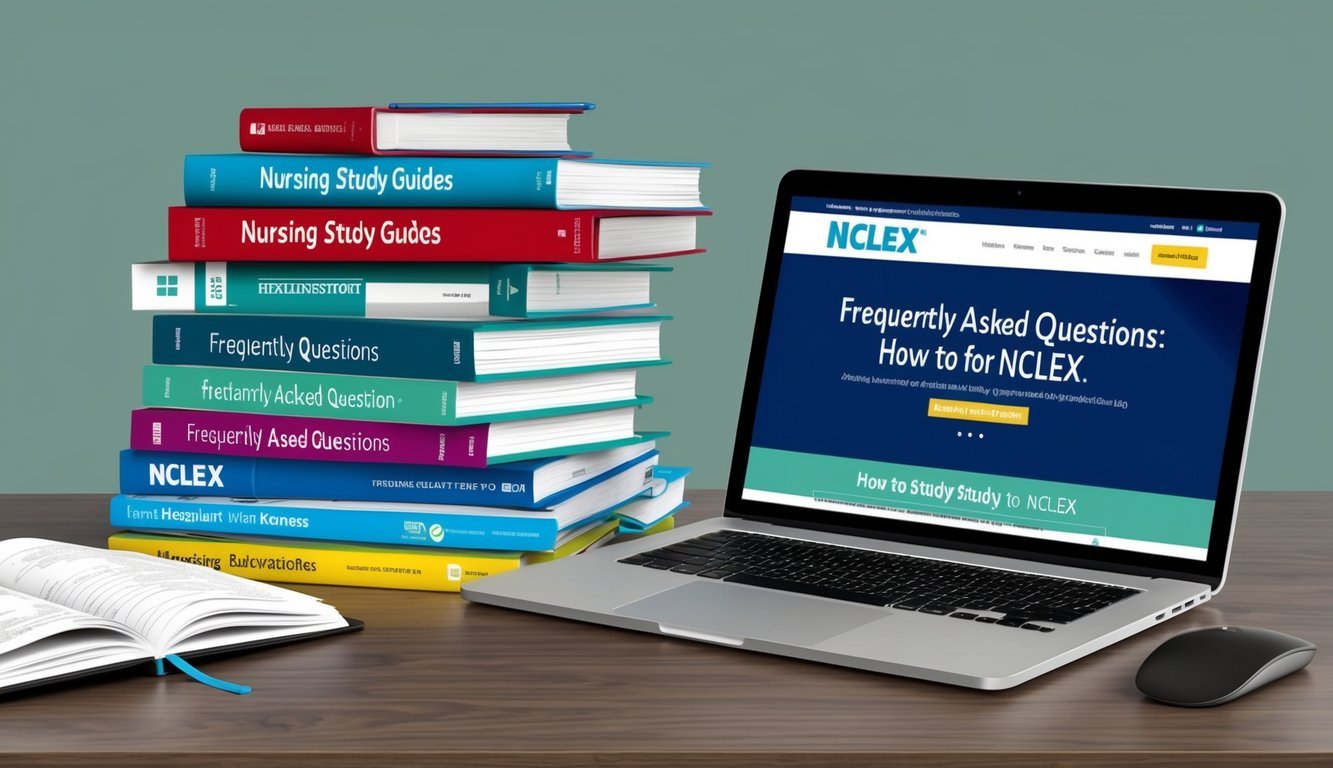Preparing for the NCLEX exam can feel overwhelming, but having a solid study plan can make a big difference.
To study effectively for the NCLEX, focus on creating a structured study schedule, mastering the test format, and practicing with real exam questions.
By doing so, you can boost your confidence and ensure that you are ready on exam day.
Understanding the content areas covered in the NCLEX is crucial for success.
Engage in active learning by using various resources, such as practice tests and study guides.
This will not only improve your knowledge but also familiarize you with the types of questions you will encounter.
As you approach the exam, remember that the right mindset matters just as much as preparation.
Stay calm, manage your time wisely during the test, and take care of yourself leading up to the big day.
With the proper strategies in place, you can navigate this important step in your nursing career with confidence.
Key Takeaways
- Create a study schedule that fits your needs and allows enough time for review.
- Familiarize yourself with NCLEX question styles to enhance test-day performance.
- Maintain a positive mindset and practice self-care as you prepare for the exam.
Understanding the NCLEX
The NCLEX exam is a crucial step for aspiring nurses to demonstrate their knowledge and skills.
It is essential to grasp the exam’s format and the client needs categories covered to prepare effectively.
Overview and format of the exam
The NCLEX-RN examination is designed to test the competence of registered nurses.
It uses a computerized adaptive testing (CAT) format, meaning that the difficulty of questions adjusts based on your answers.
Correct answers lead to harder questions, while incorrect responses provide easier ones.
The exam consists of a minimum of 75 questions and a maximum of 145 questions.
Test-takers have up to six hours to complete the exam.
Questions may include multiple-choice, fill-in-the-blank, and hot spot formats.
Familiarity with these formats can improve your ability to navigate the exam.
For more details on the structure, visit NCSBN.
Breakdown of client needs categories
The NCLEX categorizes client needs into four main areas, each focusing on different aspects of nursing.
Understanding these areas is essential for your preparation.
-
Safe and Effective Care Environment: This includes safety, infection control, and managing care environments.
-
Health Promotion and Maintenance: This area focuses on health education, disease prevention, and promotion strategies.
-
Psychosocial Integrity: Questions assess your ability to support the mental and emotional well-being of clients.
-
Physiological Integrity: This covers basic care, pharmacological therapies, and the management of potential complications.
Familiarizing yourself with the content outlines of these categories will guide your study efforts.
The National Council of State Boards of Nursing (NCSBN)
The NCSBN is responsible for developing and overseeing the NCLEX.
This organization establishes guidelines for the test to ensure all exam items are relevant and comprehensive.
Understanding the NCSBN’s role helps you appreciate the exam’s credibility.
They also provide resources such as the Next Generation NCLEX, which includes new question types that reflect real-world nursing scenarios.
Keeping up with their latest updates will aid in your preparation efforts, ensuring you are informed about any changes to the exam framework or content.
Preparation Strategies
Preparing for the NCLEX requires a structured approach and effective study methods.
Focusing on a study plan, utilizing the right resources, and enhancing your clinical judgment and critical thinking skills are all crucial components of successful NCLEX preparation.
Developing an NCLEX study plan
Creating a detailed NCLEX study plan is essential.
Start by assessing your current knowledge and identifying weak areas.
Break down your study topics according to the NCLEX Client Needs categories.
For example, you can create a chart like the following:
| Week | Topic | Study Method |
|---|---|---|
| Week 1 | Health Promotion | Read NCLEX guide |
| Week 2 | Safety and Infection Control | Practice quizzes |
| Week 3 | Psychosocial Integrity | Group study sessions |
| Week 4 | Physiological Integrity | Mock exams |
A consistent study schedule should include specific days for studying, breaks, and practice exams.
Utilize comprehensive review books or online courses to stay on track.
Establish goals for each session to ensure maximum productivity.
Effective study methods and resources
Diverse study methods can enhance your learning.
Consider mixing different techniques such as:
- Reading: Use NCLEX study guides or textbooks for foundational knowledge.
- Practice Questions: Regular practice with NCLEX-style questions from resources like Nurseslabs helps familiarize you with the exam format.
- Flashcards: Create flashcards for quick reviews of key terms and concepts.
Study resources are also vital.
Online platforms offer practice exams and review videos.
Choose materials that focus on critical topics, ensuring they align with the NCLEX test plan.
Clinical judgment and critical thinking
Improving clinical judgment and critical thinking is crucial for NCLEX success.
Make use of case studies and scenarios to apply your knowledge in real-life contexts.
Practice prioritization and decision-making skills, as the NCLEX often tests your ability to analyze situations effectively.
Engaging in group discussions can also help you think critically about patient care scenarios.
Use practice exams to simulate these situations, focusing on how you would respond to various clinical outcomes.
This targeted practice will strengthen your critical thinking skills, aligning your preparation with the expectations of the NCLEX.
Practice and Review
Effective preparation for the NCLEX involves not only studying but also practicing and reviewing your knowledge.
This process helps you understand the test format and identify areas needing improvement.
Utilizing practice questions and tests
Incorporating NCLEX practice questions into your study plan is essential.
These questions mirror the format you’ll encounter on the actual exam, helping you become familiar with select-all-that-apply questions and other types.
Aim to answer a variety of questions daily to enhance your knowledge and test-taking skills.
Consider using online resources like Nurseslabs for a wide range of practice questions.
Set specific study goals, such as completing a certain number of questions each week.
This approach builds your confidence and pinpoint areas that require more focus.
Analyzing practice test results
After completing practice tests, analyze your results thoroughly.
Review each question, especially those you answered incorrectly.
Understanding why your answer was wrong helps you learn the rationale behind the correct response.
Create a chart to track your progress.
For example, use columns for question types, correct answers, and areas needing improvement.
This method allows you to visualize your growth and strategize your next steps.
Prioritizing review topics based on your practice test performance will streamline your study sessions and increase the likelihood of exam success.
Exam Day Preparation
Preparing for the NCLEX on exam day is crucial for your success.
Knowing what to expect and how to manage your time and emotions can significantly enhance your performance.
Test-taking strategies and dealing with anxiety
To improve your test-taking skills, start by familiarizing yourself with the structure of the NCLEX.
The exam mainly features multiple-choice questions.
Here are some strategies to keep in mind:
- Read each question carefully: Pay attention to key phrases and understand what the question is really asking.
- Eliminate clearly wrong answers: This increases your chances of choosing the correct option, even if you’re unsure.
- Pace yourself: Keep an eye on the clock. Allocate time per question, but don’t rush.
Managing exam anxiety is also important.
Practice deep breathing techniques.
Before the exam, visualize a successful experience.
Break the day into manageable sections, and don’t forget to take short breaks if you feel overwhelmed.
What to expect on exam day
On exam day, arrive at the testing center early to give yourself time to settle in.
You will need to present valid identification, so ensure to have that ready.
Expect a computer-based testing environment.
The key aspects include:
- Check-in process: You will undergo security checks and a brief orientation about the exam procedures.
- Test environment: The room will have individual computer stations, and quiet is strictly enforced.
You will face a minimum of 75 questions and a maximum of 145.
Each question is designed to assess your understanding of nursing concepts.
Stay focused and remember that you can take breaks as needed.
As the exam progresses, trust your preparation and knowledge.
For more tips, consider visiting Simple Nursing.
After the Examination

After completing the NCLEX, you might feel a mix of anxiety and anticipation.
It’s important to know what to expect next.
1.
Waiting for Results
Most candidates receive their results within a few days.
Check with your state board of nursing for specific timelines.
2.
Understanding Your Results
If you pass, you will receive your nursing license, allowing you to practice as a registered nurse.
If you do not pass, it’s crucial to review the areas where you struggled.
Next Steps if You Pass:
- Apply for Your Nursing License: Submit your application to your state’s nursing board.
- Prepare for Employment: Update your resume and start applying to nursing positions.
Next Steps if You Don’t Pass:
- Analyze Your Performance: Use the NCLEX results to identify areas needing improvement.
- Create a Study Plan: Focus on weak spots and set a schedule for practice questions and review.
Resources for Further Support:
- For study strategies, check Nurse.org.
- Explore tips on improving test-taking skills from NursingProcess.org.
Staying organized and positive will help you navigate this transition successfully.
Whether you celebrate your accomplishment or prepare for another attempt, remember the goal: to become a skilled registered nurse.
Frequently Asked Questions

Preparing for the NCLEX can feel overwhelming.
Here are some specific strategies and plans to help you maximize your studying and increase your chances of passing the exam.
What are effective strategies for passing the NCLEX-RN on the first try?
To pass the NCLEX-RN on your first try, focus on several key strategies.
Use practice questions and exams regularly.
This helps you understand the question format and identify areas to improve.
Additionally, review core nursing concepts and clinical judgment skills, as these are crucial for the exam.
What does a successful 4-week NCLEX study plan look like?
A 4-week study plan should include dedicated study days and review sessions.
Below is a sample outline to guide your studies:
| Week | Focus Area | Activities |
|---|---|---|
| 1 | Foundation Knowledge | Review nursing concepts and take practice quizzes. |
| 2 | Clinical Judgment | Focus on case studies and prioritization strategies. |
| 3 | Practice Tests and Review | Complete full-length practice exams and review errors. |
| 4 | Final Review and Relaxation | Go over weak areas, do light studying, and rest. |
How can one create an NCLEX study plan if they have only one month to prepare?
If you have one month, prioritize your studying.
Break down each week by focusing on specific topics such as pharmacology, medical-surgical nursing, and maternal-child health.
Use a mix of textbooks, online resources, and practice questions to build a comprehensive study plan.
What recommendations can be provided for someone studying for the NCLEX in three weeks?
In three weeks, create a time-blocked schedule.
Allocate specific hours each day to different topics and include time for practice questions.
Aim for at least 2-3 hours of focused study daily.
Use resources like UWorld for practice questions.
How much time is typically needed to prepare for the NCLEX to ensure a passing score?
Typically, students need about 6-8 weeks to prepare adequately.
This allows for a thorough review of material and practice with questions.
Make sure to keep your study sessions consistent to build knowledge gradually.
Is a two-week preparation time sufficient to study for the NCLEX, and if so, how should one approach it?
Two weeks can be tight, but it’s possible.
Focus on high-yield topics and practice questions.
Use study guides that condense essential information.
Each day, set aside 4-6 hours for studying.
Utilize resources like NCLEX.com for FAQs and tips.

